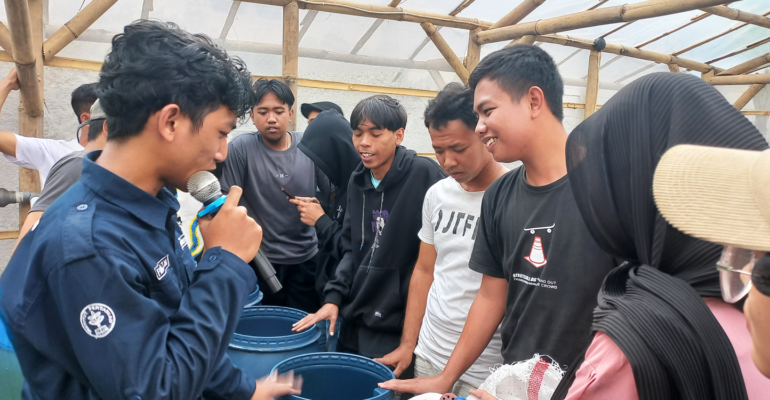Technology-Based Innovation, PPK Ormawa Team of BEM FPIK IPB Holds Training on RAS and Aquaponic Systems in Ciampea Udik Village

The Student Organization Capacity Strengthening Program (PPK Ormawa) team from the Student Executive Board (BEM) of the Faculty of Fisheries and Marine Science (FPIK) IPB University held an intensive training on Recirculating Aquaculture System (RAS) and aquaponics in Ciampea Udik Village, Bogor, West Java.
The training was attended by 11 village youths who aimed to improve their skills and knowledge in the field of aquaculture and integrated agriculture.
The RAS system training began with a theoretical presentation and hands-on practice of a series of physical, chemical and biological filters essential for maintaining water quality in fish farming ponds.
“The trainees were taught how to assemble the filters using easily available materials, such as fishing nets for physical filters, charcoal for chemical filters, and bottle caps for biological filters,” said Akmaludin, one of the team members.
In addition, Akmal continued, the youth also installed a water pump to ensure optimal water circulation. Participants conducted hands-on experiments to understand how the RAS system works in real conditions, so that they can apply this technology in their own environment.
In the aquaponics session, trainees started by learning how to sow vegetable seeds. The PPK Ormawa BEM FPIK IPB University team provided detailed guidance on seed selection, sowing techniques, and seedling care until ready to be transferred to the aquaponic system.
Participants then practiced placing the ready plants into the prepared aquaponic system, so that they understood the integration process between fish and plant farming in one sustainable system.
According to Akmal, the training is part of a community service program that aims to empower village youth through modern fisheries and agriculture technology.
“By mastering RAS and aquaponic technology, it is hoped that the youth of Ciampea Udik village can increase the productivity and sustainability of their farming business, and make a positive contribution to the village economy,” he said.
This activity is also expected to inspire other communities to continue learning and developing their potential in fields that support sustainable development. (*/Rz) (IAAS/Hap)



